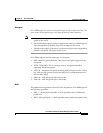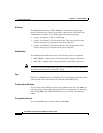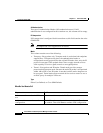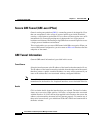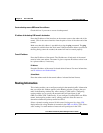
Chapter 11 Site-to-Site VPN
Create Site to Site VPN
11-16
Cisco Router and Security Device Manager 2.5 User’s Guide
OL-4015-12
Secure GRE Tunnel (GRE-over-IPSec)
Generic routing encapsulation (GRE) is a tunneling protocol developed by Cisco
that can encapsulate a wide variety of protocol packet types inside IP tunnels,
creating a virtual point-to-point link to Cisco routers at remote points over an IP
internetwork. By connecting multiprotocol subnetworks in a single-protocol
backbone environment, IP tunneling using GRE allows network expansion across
a single-protocol backbone environment.
This wizard enables you to create a GRE tunnel with IPSec encryption. When you
create a GRE tunnel configuration, you also create an IPSec rule that describes the
endpoints of the tunnel.
GRE Tunnel Information
General GRE tunnel information is provided in this screen.
Tunnel Source
Select the interface name or the IP address of the interface that the tunnel will use.
The IP address of the interface must be reachable from the other end of the tunnel;
therefore it must a a public, routable IP address. An error will be generated if you
enter an IP address that is not associated with any configured interface.
Note Cisco SDM lists interfaces with static IP addresses and interfaces configured as
unnumbered in the Interface list. Loopback interfaces are not included in the list.
Details
Click to obtain details about the interface that you selected. The details window
shows any access rules, IPSec policies, NAT rules, or Inspection rules associated
with the interface. If a NAT rule has been applied to this interface that causes the
address to be unroutable, the tunnel will not operate properly. To examine any of
these rules in more detail, go to Additional Tasks/ACL Editor and examine the in
the Rules window.




